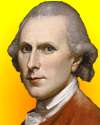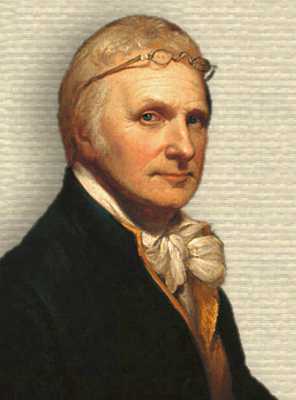 (source)
(source)
|
Charles Willson Peale
(15 Apr 1741 - 22 Feb 1827)
American artist and naturalist who opened the first U.S. popular Museum of Natural Science and Art. While a portrait painter, Peale also maintained a diverse interest in science, and held several patents for inventions.
|
Science Quotes by Charles Willson Peale (5 quotes)
A taste for natural enquiries is not only useful in the highest degree, but a neverfailing source of the most exalted enjoyment; a more rational pleasure cannot possibly occupy the attention or captivate the affections of mankind, than that which arises from a due consideration of the works of nature.
— Charles Willson Peale
From Introduction to a Course of Lectures on Natural History: Delivered in the University of Pennsylvania, Nov. 16, 1799 (1800), 9.
Natural history is not only interesting to the individual, it ought to become a NATIONAL CONCERN, since it is a NATIONAL GOOD,—of this, agriculture, as it is the most important occupation, affords the most striking proof.
— Charles Willson Peale
From Introduction to a Course of Lectures on Natural History: Delivered in the University of Pennsylvania, Nov. 16, 1799 (1800), 12.
Nature is silent only to those who know not how to interrogate her—to the man of inquisitive mind she offers ample instruction.
— Charles Willson Peale
From Introduction to a Course of Lectures on Natural History: Delivered in the University of Pennsylvania, Nov. 16, 1799 (1800), 16.
The world is a museum in which all men are destined to be employed and amused, and they cannot be too much interested in the objects around them. Goldsmith the elegant imitator of Buffon, says “The mere uninformed spectator passes on in gloomy solitude; while the naturalist in every plant, in every insect, and in every pebble, finds something to entertain his curiosity and excite his speculation.”
— Charles Willson Peale
From Introduction to a Course of Lectures on Natural History: Delivered in the University of Pennsylvania, Nov. 16, 1799 (1800), 19.
What more pleasing prospect can be opened to our view than the boundless field of nature? not only comprehending the inhabitants of earth, sea, and air; but earth, sea and air themselves—presenting an inexhaustible fund for amusing and useful enquiry.
— Charles Willson Peale
From Introduction to a Course of Lectures on Natural History: Delivered in the University of Pennsylvania, Nov. 16, 1799 (1800), 6.
See also:
- 15 Apr - short biography, births, deaths and events on date of Peale's birth.
- The Peale Museum - from his lecture (1799).
- Mr. Peale's Museum, by Charles Coleman Sellers. - book suggestion.

 In science it often happens that scientists say, 'You know that's a really good argument; my position is mistaken,' and then they would actually change their minds and you never hear that old view from them again. They really do it. It doesn't happen as often as it should, because scientists are human and change is sometimes painful. But it happens every day. I cannot recall the last time something like that happened in politics or religion.
(1987) --
In science it often happens that scientists say, 'You know that's a really good argument; my position is mistaken,' and then they would actually change their minds and you never hear that old view from them again. They really do it. It doesn't happen as often as it should, because scientists are human and change is sometimes painful. But it happens every day. I cannot recall the last time something like that happened in politics or religion.
(1987) -- 


